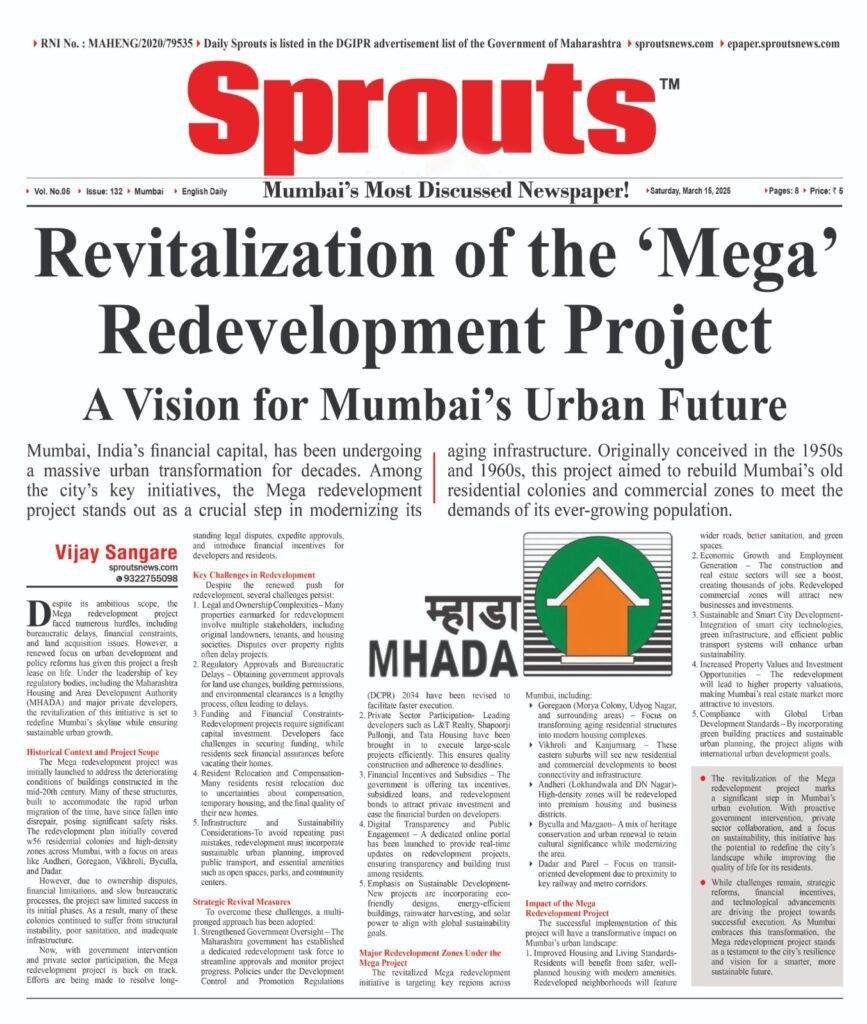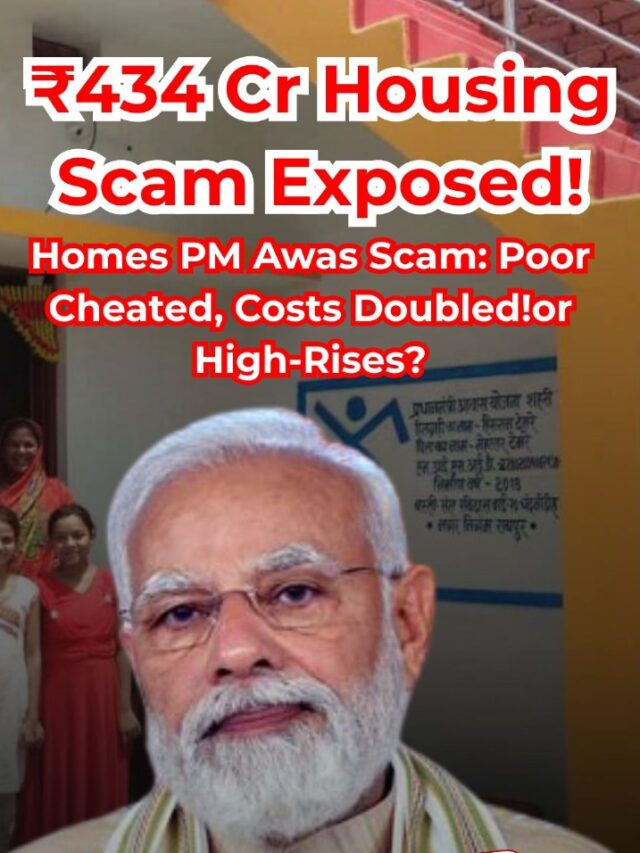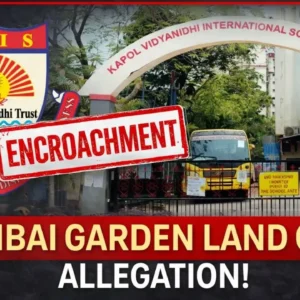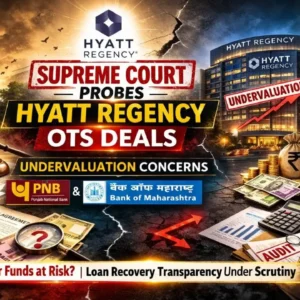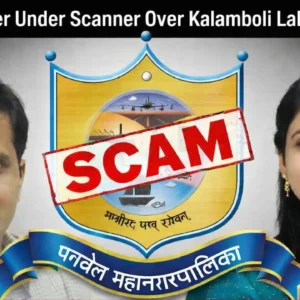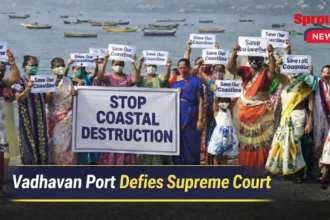
Revitalization of the ‘Mega’ Redevelopment Project:
A Vision for Mumbai’s Urban Future
A Vision for Mumbai’s Urban Future
Vijay Sangare
Sprouts News Exclusive
Mumbai, India’s financial capital, has been undergoing a massive urban transformation for decades. Among the city’s key initiatives, the Mega redevelopment project stands out as a crucial step in modernizing its aging infrastructure. Originally conceived in the 1950s and 1960s, this project aimed to rebuild Mumbai’s old residential colonies and commercial zones to meet the demands of its ever-growing population.
Despite its ambitious scope, the Mega redevelopment project faced numerous hurdles, including bureaucratic delays, financial constraints, and land acquisition issues. However, a renewed focus on urban development and policy reforms has given this project a fresh lease on life. Under the leadership of key regulatory bodies, including the Maharashtra Housing and Area Development Authority (MHADA) and major private developers, the revitalization of this initiative is set to redefine Mumbai’s skyline while ensuring sustainable urban growth.
• Historical Context and Project Scope
The Mega redevelopment project was initially launched to address the deteriorating conditions of buildings constructed in the mid-20th century. Many of these structures, built to accommodate the rapid urban migration of the time, have since fallen into disrepair, posing significant safety risks. The redevelopment plan initially covered 56 residential colonies and high-density zones across Mumbai, with a focus on areas like Andheri, Goregaon, Vikhroli, Byculla, and Dadar.
However, due to ownership disputes, financial limitations, and slow bureaucratic processes, the project saw limited success in its initial phases. As a result, many of these colonies continued to suffer from structural instability, poor sanitation, and inadequate infrastructure.

Now, with government intervention and private sector participation, the Mega redevelopment project is back on track. Efforts are being made to resolve long-standing legal disputes, expedite approvals, and introduce financial incentives for developers and residents.
• Key Challenges in Redevelopment
Despite the renewed push for redevelopment, several challenges persist:
1. Legal and Ownership Complexities – Many properties earmarked for redevelopment involve multiple stakeholders, including original landowners, tenants, and housing societies. Disputes over property rights often delay projects.
2. Regulatory Approvals and Bureaucratic Delays – Obtaining government approvals for land use changes, building permissions, and environmental clearances is a lengthy process, often leading to delays.
3. Funding and Financial Constraints – Redevelopment projects require significant capital investment. Developers face challenges in securing funding, while residents seek financial assurances before vacating their homes.
4. Resident Relocation and Compensation – Many residents resist relocation due to uncertainties about compensation, temporary housing, and the final quality of their new homes.
5. Infrastructure and Sustainability Considerations – To avoid repeating past mistakes, redevelopment must incorporate sustainable urban planning, improved public transport, and essential amenities such as open spaces, parks, and community centers.
• Strategic Revival Measures
To overcome these challenges, a multi-pronged approach has been adopted:
1. Strengthened Government Oversight – The Maharashtra government has established a dedicated redevelopment task force to streamline approvals and monitor project progress. Policies under the Development Control and Promotion Regulations (DCPR) 2034 have been revised to facilitate faster execution.
2. Private Sector Participation – Leading developers such as L&T Realty, Shapoorji Pallonji, and Tata Housing have been brought in to execute large-scale projects efficiently. This ensures quality construction and adherence to deadlines.
3. Financial Incentives and Subsidies – The government is offering tax incentives, subsidized loans, and redevelopment bonds to attract private investment and ease the financial burden on developers.
4. Digital Transparency and Public Engagement – A dedicated online portal has been launched to provide real-time updates on redevelopment projects, ensuring transparency and building trust among residents.
5. Emphasis on Sustainable Development – New projects are incorporating eco-friendly designs, energy-efficient buildings, rainwater harvesting, and solar power to align with global sustainability goals.
• Major Redevelopment Zones Under the Mega Project
The revitalized Mega redevelopment initiative is targeting key regions across Mumbai, including:
– Goregaon (Morya Colony, Udyog Nagar, and surrounding areas) – Focus on transforming aging residential structures into modern housing complexes.
– Vikhroli and Kanjurmarg – These eastern suburbs will see new residential and commercial developments to boost connectivity and infrastructure.
– Andheri (Lokhandwala and DN Nagar) – High-density zones will be redeveloped into premium housing and business districts.
– Byculla and Mazgaon– A mix of heritage conservation and urban renewal to retain cultural significance while modernizing the area.
– Dadar and Parel – Focus on transit-oriented development due to proximity to key railway and metro corridors.
Also Read: YouTube’s Double Standards Exposed: PIL Against YouTube in Ranveer Allahbadia Case.
• Impact of the Mega Redevelopment Project
The successful implementation of this project will have a transformative impact on Mumbai’s urban landscape:
1. Improved Housing and Living Standards – Residents will benefit from safer, well-planned housing with modern amenities. Redeveloped neighborhoods will feature wider roads, better sanitation, and green spaces.
2. Economic Growth and Employment Generation – The construction and real estate sectors will see a boost, creating thousands of jobs. Redeveloped commercial zones will attract new businesses and investments.
3. Sustainable and Smart City Development – Integration of smart city technologies, green infrastructure, and efficient public transport systems will enhance urban sustainability.
4. Increased Property Values and Investment Opportunities – The redevelopment will lead to higher property valuations, making Mumbai’s real estate market more attractive to investors.
5. Compliance with Global Urban Development Standards – By incorporating green building practices and sustainable urban planning, the project aligns with international urban development goals.
The revitalization of the Mega redevelopment project marks a significant step in Mumbai’s urban evolution. With proactive government intervention, private sector collaboration, and a focus on sustainability, this initiative has the potential to redefine the city’s landscape while improving the quality of life for its residents.
While challenges remain, strategic reforms, financial incentives, and technological advancements are driving the project towards successful execution. As Mumbai embraces this transformation, the Mega redevelopment project stands as a testament to the city’s resilience and vision for a smarter, more sustainable future.


